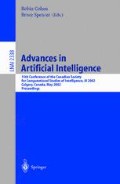Abstract
Text summarization addresses the problem of selecting the most important portions of the text and the problem of producing coherent summaries. The goal of this paper is to show how these objectives can be achieved through an efficient use of lexical cohesion. The method addresses both generic and query-based summaries. We present an approach for identifying the most important portions of the text which are topically best suited to represent the source text according to the author’s views or in response to the user’s interests. This identification must also take into consideration the degree of connectiveness among the chosen text portions so as to minimize the danger of producing summaries which contain poorly linked sentences. These objectives can be achieved through an efficient use of lexical cohesion. We present a system that handles these objectives, we discuss the performance of the system, we compare it to other systems, and we outline some future works.
Access this chapter
Tax calculation will be finalised at checkout
Purchases are for personal use only
Preview
Unable to display preview. Download preview PDF.
References
Mani, I., Maybury, M.: Advances in Automatic Text Summarization. MIT Press (1999)
McKeown, K. R., Klavans, J. L., Hatzivassiloglou, V., Barzilay, R., Eskin, E.: Towards multidocument summarization by reformulation: Progreess and prospects. In: Proceedings of the Sixteenth National Conference on Artificial Intelligence, Orlando (1999)
Barzilay, R., McKweon, K., Elhadad, M.: Information fusion in the context of multi-document summarization. In: Proceedings of the 37th Annual Meeting of the Association for Computational Linguistics (ACL-99), College Park, Maryland (1999) 550–557
Jing, H., McKeown, K. R.: The decomposition of human-written summary sentences. In: Proceedings 22nd International ACM Conference on Research and Development in Information Retrieval (SIGIR-99), Berkeley (1999)
Mani, I., Gates, B., Bloedorn, E.: Improving summaries by revising them. In: Proceedings of the 37th Annual Meeting of the Association for Computational Linguistics, Maryland (1999) 558–565
Witbrock, M., Mittal, V.: Ultra-summarization: A statistical approach to generating highly condensed non-extractive summaries. In: Proceedings 22nd International ACM Conference on Research and Development in Information Retrieval (SIGIR-99), Berkeley (1999)
Jing, H., McKeown, K. R.: Cut and paste based text summarization. In: Proceedings of the 1st North American Chapter of the Association for Computational Linguistics, Seattle (2000)
Knight, K., Marcu, D.: Statistics-based summarization-step one: Sentence compression. In: Proceedings of the 17th National Conference on Artificial Intelligence, Austin (2000)
Hovy, E., Marcu, D.: Tutorial notes on automated text summarization. In: 36th Annual Meeting of the Association for Computational Linguistics and 17th International Conference on Computational Linguistics (COLING-ACL’98), Montreal (1998)
Sparck Jones, K.: Summarising: Where are we now? where should we go? Talk in the ACL/EACL Workshop on Intelligent Scalable Text Summarization (1997)
Mani, I., Bloedorn, E.: Machine learning of generic and user-focused summarization. In: Proceedings of the 15th National Conference on Artificial Intelligence, Madison, Wisconsin (1998) 821–826
Choi, F. Y. Y.: Advances in domain independent linear text segmentation. In: Proceedings of the 1st North American Chapter of the Association for Computational Linguistics, Seattle, Washington (2000) 26–33
Ratnaparkhi, A.: A maximum entropy part-of-speech tagger. In: Proceedings of the Empirical Methods in Natural Language Processing Conference, University of Pennsylvania (1996)
Reynar, J. C., Ratnaparkhi, A.: A maximum entropy approach to identifying sentence boundaries. In: Proceedings of the Fifth Conference on Applied Natural Language Processing, Washington, D. C. (1997)
Collins, M.: Three generative, lexicalized models for statistical parsing. In: Proceedings of the 35th Annual Meeting of the Association for Computational Linguistics (ACL-97), Spain (1997)
Morris, J., Hirst, G.: Lexical cohesion computed by thesaural relations as an indicator of the structure of text. Computational Linguistics 17 (1991) 21–48
Hoey, M.: Patterns of Lexis in Text. Oxford University Press (1991)
Brunn, M., Chali, Y., Pinchak, C. J.: Text summarization using lexical chains. In: Proceedings of the Document Understanding Conference, New Orleans, NIST (2001) 135–140
Stairmand, M. A.: A Computational Analysis of Lexical Cohesion with Applications in Information Retrieval. PhD thesis, Center for Computational Linguistics, UMIST, Manchester (1996)
Hirst, G., St-Onge, D.: Lexical chains as representation of context for the detection and correction of malapropisms. In Fellbaum, C. ed.: WordNet: An Electronic Lexical Database and Some of its Applications. MIT Press (1997)
Barzilay, R., Elhadad, M.: Using lexical chains for text summarization. In: ACL/EACL Workshop on Intelligent Scalable Text Summarization, Madrid (1997) 10–17
Chali, Y., Matwin, S., Szpakowicz, S.: Query-biased text summarization as a question-answering technique. In: Proceedings of AAAI Symposium on Question-Answering Systems, Massachusetts, AAAI Press (1999) 52–56
Author information
Authors and Affiliations
Editor information
Editors and Affiliations
Rights and permissions
Copyright information
© 2002 Springer-Verlag Berlin Heidelberg
About this paper
Cite this paper
Chali, Y. (2002). Generic and Query-Based Text Summarization Using Lexical Cohesion. In: Cohen, R., Spencer, B. (eds) Advances in Artificial Intelligence. Canadian AI 2002. Lecture Notes in Computer Science(), vol 2338. Springer, Berlin, Heidelberg. https://doi.org/10.1007/3-540-47922-8_24
Download citation
DOI: https://doi.org/10.1007/3-540-47922-8_24
Published:
Publisher Name: Springer, Berlin, Heidelberg
Print ISBN: 978-3-540-43724-6
Online ISBN: 978-3-540-47922-2
eBook Packages: Springer Book Archive

